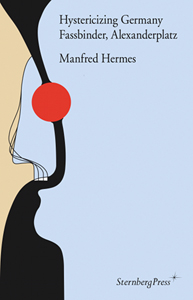An excursive analysis of the potential of narration within the paradoxes of cinematic representation.
Rainer Werner Fassbinder's fourteen-part Berlin Alexanderplatz, broadcast on German television in 1980, is a pivotal work in the artist's oeuvre. The 1929 novel by Alfred Döblin, a subproletarian apocalypse set in the Weimar Republic, provided Fassbinder with material to historicize the avant-garde of the 1920s and redetermine the relationship between utopianism and popular address. While Döblin created his protagonist to be a hysteric, Fassbinder wanted to hystericize the viewer. In this work, along with others from the same period, Fassbinder established a Jewish-German mirror rotating on the axis of the Holocaust.
In Hystericizing Germany, Manfred Hermes provides an excursive analysis of the potential of narration within the paradoxes of cinematic representation, with Fassbinder's miniseries forming both beginning and end point.
Translated from the German by Nicholas Grindell.
Graphic design by HIT.
published in March 2015
English edition
12,7 x 19,7 cm (softcover)
224 pages
ISBN : 978-3-95679-004-1
EAN : 9783956790041
in stock

